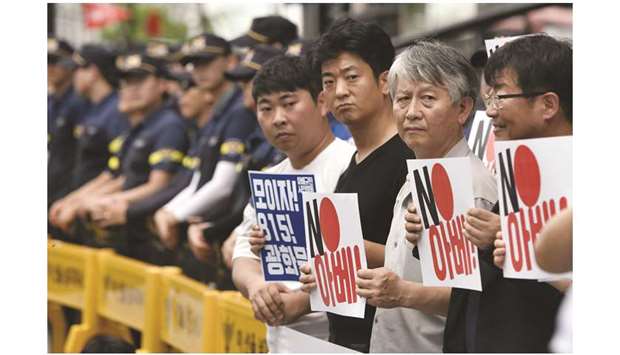Japan and South Korea yesterday rescinded each other’s favoured export partner status in an escalating row as relations between the US allies hit a new low.
The two countries are mired in long-running disputes over the use of forced labour during World War II.
But Tokyo, which made the first move despite US calls for both to calm tensions amid concern over their security relationship, insisted it was acting on national security grounds rather than retaliation.
“The government at a cabinet meeting today approved a revision to the export control law”, known as the ‘white list’, Japan’s Trade Minister Hiroshige Seko told reporters. “South Korea, the only Asian nation on the list, will be removed.”
South Korean President Moon Jae-in called the move “very reckless”, warning that “responsibility for what is going to happen next also lies squarely with the Japanese government”.
“We will never again lose to Japan,” he added.
Hours later his finance minister Hong Nam-ki announced Seoul would reciprocate. Tokyo’s decision “fundamentally destroys the relations of trust and cooperation that the two countries established”, he said.
The moves mean hundreds of products that could be diverted to military use will be subject to tighter export controls in both directions.
Some experts said the effect of Tokyo’s decision would be more symbolic than economic, with Nomura Securities senior economist Hajime Yoshimoto saying it would have “only have a limited impact on the South Korean economy”.
Many major Japanese exporters already have special permission, to ship to non-white-list countries with simplified procedures according to the trade ministry.
But Mun Byung-ki of the Korea International Trade Association said the auto and consumer electronics industries were likely to be among many sectors
affected.
In the case of OLED display panels used in smartphones and televisions, among other devices, he said the restrictions “will affect companies outside of South Korea and Japan, as Korean firms – LG Display and Samsung Electronics – are key players in the global market”.
The moves are the latest blow to ties between South Korea and Japan, which have been strained for decades as a result of Tokyo’s brutal 1910-45 colonial rule over the Korean peninsula.
Politicians on both sides exploit the issue for domestic political purposes, according to analysts.
And a string of South Korean court rulings ordering Japanese companies to compensate forced labour victims has infuriated Japan, which argues the issue was resolved when the two countries normalised ties in 1965.
Tokyo had already tightened rules last month on exports of three products key to South Korea’s chip and smartphone industries, raising fears for
global supply in the sectors.
“I’d like to make it clear that this is not an export embargo,” Seko said yesterday.
“We believe stripping South Korea of preferential treatment does not affect the global supply chain or have a negative impact on Japanese companies.”
Japanese officials say both the specific export restrictions imposed last month and the white list removal are not a “retaliation” though they have cited a “loss of trust” in ties with Seoul.

South Korean protesters hold placards reading u201cNo Abe!u201d during a rally against Japan’s decision to remove South Korea from a so-called white list of favoured export partners, in front of the Japanese embassy in Seoul yesterday.
